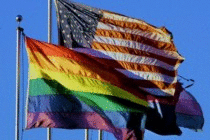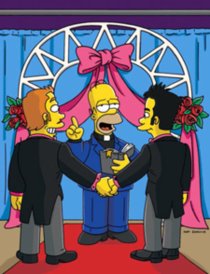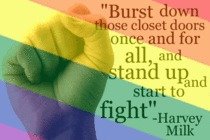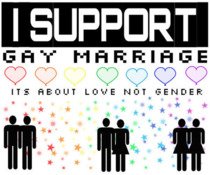 "Are you a homosexual?" she asked.
"Are you a homosexual?" she asked."Excuse me?" I responded.
"Are you a homosexual?" she asked again.
It was not her second question, or the third, but the first question once I told her I was interested in adopting.
Her name was Sue. She was the on-phone representation of "Our Kids" one of Miami's premiere adoption agencies. Given Florida's anti-gay adoption laws, I didn't blame her for her question, but I didn't like it, either. I knew if I were to tell the truth, that my partner and I are gay men who want kids, the call would be over. I knew if I lied, we might move forward, and maybe even end up with a child, acquired under false pretenses with one of us as the parent and the other pretending, all the while building a web of lies to prove our acceptability to a system that has deemed us unworthy.
Unwilling to lie, I told her the truth and the call quickly ended.
All we wanted were kids and a family, when there are so many kids in the state of Florida who need families.
David Strah, in his book Gay Dads, talks about the growing phenomenon of gay fatherhood, and how so many of us, upon coming out, thought we had to give up the dream of ever becoming a parent. Instead, Strah argues, the instinct to build families and raise kids is a part of who we are, straight or gay. It is a right of being human that we don't have to abdicate because of our sexual orientation.
That said, I wish the state of Florida felt the same.
Not long after that call my husband and I were invited to a welcome home party for two beautiful twin boys who had been adopted by a friend and his same sex partner. The boys were born out of state and were now, at one year old, finally coming home. Their story gave us hope, but it also raised a lot of questions. How did they locate these boys? How did they manage this out-of-state adoption? Was the adoption legal in Florida? And, why'd it take a year to bring them home? Little did I know these questions and their answers would drive our lives for the next year.
My former colleague directed us to an out of state attorney who specialized in counseling prospective adoptive parents. Familiar with Florida's anti-gay adoption laws he made one thing very clear, "When you locate the right baby for you, you'll likely have to move there, take up residency and wait out the 6 months to a year for the adoption to be finalized before you can go back to Florida." Additionally, we were told, without reservation, were we to return to Florida before finalization, the Department of Children and Families has the right to take our child away from us and put our child into foster care. We could then lose our child forever.
"But, what if we were straight?" I asked.
"Then you'd take your baby right home," he responded. "Florida would honor with full faith and credit the court's decision in the birth state and you'd wait for finalization while living at home in Florida."
"Wow!" I responded. "Not only is Florida discriminating against gay people as parents, but also against those of us who can't afford the time of the money to disappear for up to a year."
"Exactly," he said.
That reality made me sad. As an unemployed former news anchor I had the time, and with a husband who has a great job and career, we could make it work financially. But what about the school teachers who'd make great parents? Or, what about all those loving and embracing would-be working class and middle class gay parents who might make the choice to adopt if only the state of Florida didn't stand in their way?
Regardless, grateful for our relative good position, we decided to move forward, and so we scheduled a home study with a Florida state approved child placement agency.
The home study went great. They reviewed our histories, our families, friends, education, finances, pet records and medical records. They came to our home and put their findings together in a report that would be delivered to any judge considering placement. We felt great about it, but there was one significant catch. No matter what they'd concluded, it was against the law for us to be approved. No set of circumstances, no matter how potentially favorable to an adoptive child, could be enough to get approval. Approval was against the law.
In good faith, however, they did the next best thing. Hoping a judge in another state would read between the lines, they wrote, "this agency -- regrettably -- cannot pursuant to Florida Statue 63.042(3) approve either Mr. Perez or Mr. Rinehard for adoption. However, I can offer this: But for Florida Statue 63.042(3), this agency would highly recommend Mr. Perez and Mr. Rinehard as adoptive parents without reservation."
Though these words would not open any doors in Florida, they would open doors somewhere else. Our first stop was Missouri.
Mary Ann was identified as our first potential birth mother. She said she was pregnant with twins, a boy and a girl! After 2 weeks on the phone and a couple of Western Union cash transfers, everything changed. We wanted her medical records to both confirm her pregnancy and learn the health in the baby. That's when she disappeared.
Next there was Cindy. Cindy lived in a Chicago half-way house designed to get her back on her feet after serving prison time. We liked that she lived in a controlled environment since the earliest days of her pregnancy. She talked to us about her dreams for her daughter and how she knew we were the ones to parent her child. But then, on a trip to Chicago to meet her, she turned. She was demanding money like only a drug addict or someone who's been around one can understand. She left her halfway house, returned to the streets and decided to spend the last trimester of her pregnancy on crack cocaine. She told us, "This is not about you. It's not about the baby. It's about me." We walked away.
Finally, we came to the woman who would be our birth mother. She was a smart, sweet, drug free young woman from Kansas, who just didn't want to have another child. She didn't seem to care that we were gay, and neither did the State of Kansas. Kansas has no laws supporting gay adoption, but they also have no laws banning it.
Having asking us to be in the delivery room, we cut the umbilical chord and witnessed our daughter's first courageous reach up and out of the womb and into the world. It was glorious. Tears ran from our eyes for about 3 days. They were tears of love and gratitude. Gratitude for our beautiful daughter, for the gracious and generous birth parents who put their baby ahead of themselves and gratitude for the state of Kansas, that put its babies before bigotry.
Then, in the midst of this celebration, we received a final slap from the State of Florida. We discovered we were unable to get health insurance for our little girl because our insurance policies required that any adoption be in compliance with Florida Statute. Now, we thought, not only are they hurting us.. they're hurting our baby. So for now, we wait, pray for good health, and hope that Medicaid will fill any gap should anything unthinkable happen.
It's been a roller coaster of a ride, filled with hope and disappointment, love and acceptance, birth and renewal. But, in short, we'd do it again. The experience of seeing our love amplified into a family has had the effect of making all those other important things in our lives seem small. It is a blessing that we deserve. But, more importantly, it is a blessing every Florida child deserves.
So, for now, we remain in Kansas, blissfully changing diapers, alternating midnight feedings, staring into her deep blue eyes, and wondering why this couldn't have happened in Florida.
Charles Perez is a former main anchor at Miami's ABC station and an anchor at New York's WABC. He and his Husband, Keith Rinehard were married in Westport CT in September 2009. Perez' book, Confessions of a Gay Anchorman comes out in November.










No comments:
Post a Comment